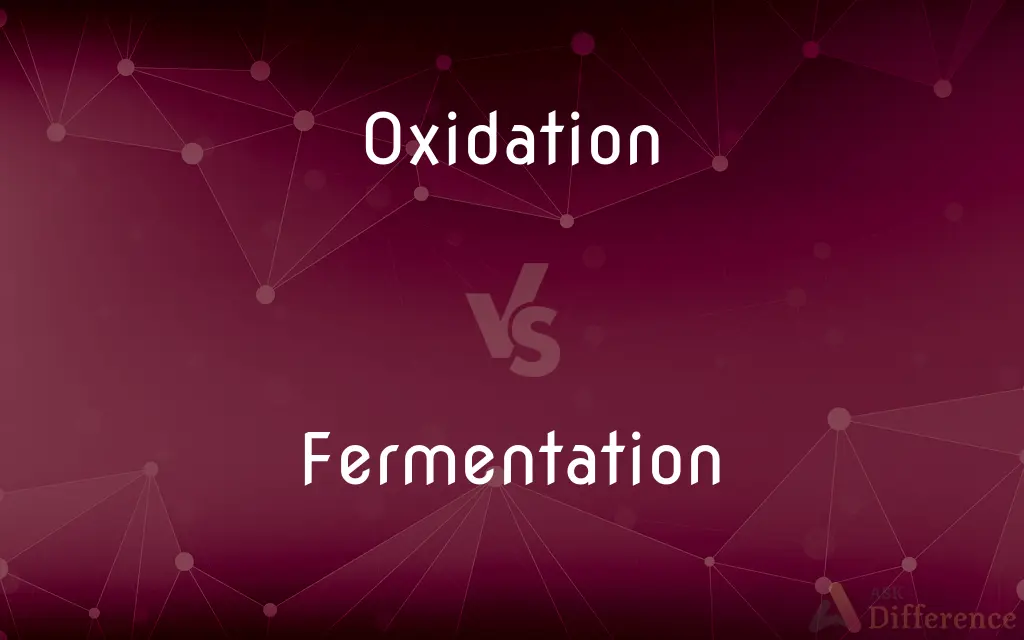Oxidation vs. Fermentation — What's the Difference?
By Tayyaba Rehman — Updated on September 27, 2023
Oxidation is a chemical process involving the loss of electrons or gain of oxygen. Fermentation is a metabolic process that converts sugar to acids, gases, or alcohol without oxygen. Both are crucial in various biological and chemical processes.

Difference Between Oxidation and Fermentation
Table of Contents
ADVERTISEMENT
Key Differences
Oxidation refers to a chemical reaction wherein a substance loses electrons or gains oxygen. Fermentation, conversely, is a biological process where microorganisms, such as yeast and bacteria, convert sugars and starches into other compounds, usually without the presence of oxygen.
Oxidation is a broad term that can occur in various scenarios, including combustion, rusting, and cellular respiration. Fermentation is more specific, often associated with the production of alcoholic beverages, bread, and certain dairy products.
In oxidation reactions, the substance being oxidized can interact directly with oxygen or other oxidizing agents. Fermentation generally occurs in an anaerobic environment, meaning oxygen is largely absent, leading to the production of energy without cellular respiration.
Oxidation has a pivotal role in many industrial and natural processes, driving energy production, metal corrosion, and various chemical reactions. Fermentation's significance lies in food and beverage production, preservation, and some medicinal applications.
While both oxidation and fermentation can produce energy, particularly in biological systems, their mechanisms and byproducts differ. Oxidation in cells produces water and carbon dioxide, whereas fermentation produces alcohol, lactic acid, or other compounds.
ADVERTISEMENT
Comparison Chart
Definition
Chemical reaction with loss of electrons or gain of oxygen
Metabolic process converting sugar without oxygen
Occurrence
Broad scenarios: combustion, rusting, cellular respiration
Specific: alcoholic beverages, bread, dairy
Dependence on Oxygen
Can directly involve oxygen
Usually anaerobic, without oxygen
Industrial/Biological Role
Energy production, metal corrosion, chemical reactions
Food and beverage production, preservation
Typical Byproducts
Water, carbon dioxide
Alcohol, lactic acid, gases
Compare with Definitions
Oxidation
A reaction in which a substance loses electrons.
The oxidation of iron results in rust.
Fermentation
A method used in producing and preserving foods.
Sauerkraut is made by cabbage fermentation.
Oxidation
A process involving the gain of oxygen.
The apple turned brown due to oxidation.
Fermentation
A metabolic process converting sugar into acids, gases, or alcohol.
Beer is made through the fermentation of barley.
Oxidation
A transformation resulting in an increase in oxidation state.
In batteries, oxidation occurs at the anode.
Fermentation
A process generating energy without using oxygen.
Muscle cells undergo fermentation under strenuous activity.
Oxidation
A process causing degradation or breakdown.
Oxidation of fats leads to rancidity.
Fermentation
An anaerobic reaction led by microorganisms.
Yogurt results from milk's fermentation by bacteria.
Oxidation
A mechanism crucial for cellular energy production.
Cellular respiration is an oxidation process.
Fermentation
Fermentation is a metabolic process that produces chemical changes in organic substrates through the action of enzymes. In biochemistry, it is narrowly defined as the extraction of energy from carbohydrates in the absence of oxygen.
Oxidation
The process or result of oxidizing or being oxidized.
Fermentation
Any of a group of chemical reactions induced by microorganisms or enzymes that split complex organic compounds into relatively simple substances, especially the anaerobic conversion of sugar to carbon dioxide and alcohol by yeast.
Oxidation
The combination of a substance with oxygen.
Fermentation
Unrest; agitation.
Oxidation
A reaction in which the atoms of an element lose electrons and the valence of the element is correspondingly increased.
Fermentation
(biochemistry) Any of many anaerobic biochemical reactions in which an enzyme (or several enzymes produced by a microorganism) catalyses the conversion of one substance into another; especially the conversion (using yeast) of sugars to alcohol or acetic acid with the evolution of carbon dioxide
Oxidation
The combination of a substance with oxygen.
Fermentation
A state of agitation or excitement; a ferment.
Oxidation
(chemistry) A reaction in which the atoms of an element lose electrons and the oxidation state of the element increases.
Fermentation
The process of undergoing an effervescent change, as by the action of yeast;
Oxidation
The act or process of oxidizing, or the state or result of being oxidized.
Fermentation
A state of agitation or excitement, as of the intellect or the feelings.
It puts the soul to fermentation and activity.
A univesal fermentation of human thought and faith.
Oxidation
The process of oxidizing; the addition of oxygen to a compound with a loss of electrons; always occurs accompanied by reduction
Fermentation
A process in which an agent causes an organic substance to break down into simpler substances; especially, the anaerobic breakdown of sugar into alcohol
Fermentation
A state of agitation or turbulent change or development;
The political ferment produced a new leadership
Social unrest
Fermentation
A chemical phenomenon in which an organic molecule splits into simpler substances
Fermentation
A chemical transformation of organic substances.
Fermentation turns grape juice into wine.
Common Curiosities
What's the primary distinction between oxidation and fermentation?
Oxidation involves electron loss or oxygen gain, while fermentation converts sugars without oxygen.
Can oxidation produce energy?
Yes, oxidation reactions in cells produce energy, essential for life.
Is yogurt a result of fermentation?
Yes, yogurt is made through the fermentation of milk by specific bacteria.
Is fermentation always anaerobic?
Fermentation typically occurs anaerobically but some processes can happen in the presence of limited oxygen.
What's a common product of fermentation in beer-making?
Alcohol, specifically ethanol, is produced in beer fermentation.
Why is fermentation crucial for bread-making?
Fermentation causes dough to rise due to gas production, mainly carbon dioxide.
Can oxidation occur without oxygen?
Yes, oxidation can involve electron loss without directly using oxygen.
Does oxidation always result in degradation?
Often, but not always. Oxidation can lead to both beneficial and detrimental outcomes.
How does fermentation benefit food preservation?
Fermentation can produce acids or alcohol that inhibit spoilage microorganisms.
What causes iron to rust?
Iron rusts due to oxidation when it reacts with moisture and oxygen.
Does oxidation always involve a visible change?
No, oxidation can occur without noticeable changes, especially on a molecular level.
Is wine made through fermentation?
Yes, wine is produced by fermenting grape juice.
What's a visible sign of oxidation in food?
A common sign is browning, as seen in cut apples exposed to air.
Are antioxidants related to oxidation?
Yes, antioxidants counteract or prevent oxidation, protecting cells from damage.
Are all fermented foods alcoholic?
No, many fermented foods, like yogurt or sauerkraut, are non-alcoholic.
Share Your Discovery

Previous Comparison
Guardian vs. Caregiver
Next Comparison
Organosol vs. PlastisolAuthor Spotlight
Written by
Tayyaba RehmanTayyaba Rehman is a distinguished writer, currently serving as a primary contributor to askdifference.com. As a researcher in semantics and etymology, Tayyaba's passion for the complexity of languages and their distinctions has found a perfect home on the platform. Tayyaba delves into the intricacies of language, distinguishing between commonly confused words and phrases, thereby providing clarity for readers worldwide.
















































